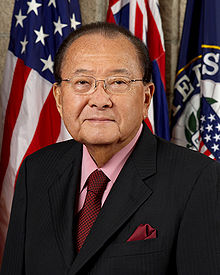Daniel Inouye
Daniel Ken Inouye (born September 7, 1924 in Honolulu , Territory of Hawaii , † December 17, 2012 in Bethesda , Maryland ) was an American politician and from 1963 until his death US Senator for the state of Hawaii . He belonged to the Democratic Party and had been one of the most influential politicians in the Senate as chairman of the investment committee since 2009 .
Inouye was awarded the Medal of Honor . He was the first ever Japanese American in both houses of Congress , a member of which he had been since 1959, when Hawaii became a state. Inouye was President pro tempore of the Senate from mid-2010 until his death .
biography

Inouye was born in Honolulu in 1924, the son of first-generation Japanese immigrants, Kame Imanaga and Hyōtarō Inouye. He grew up in the Bingham Tract , a Sino-American enclave in the Moiliili district, which is dominated by Japanese immigrants . He was a volunteer medic during the attack on Pearl Harbor . When the US Army lifted the ban on Japanese Americans in 1943, Inouye interrupted his medical training and enlisted in the Army. He was assigned to the 442nd Infantry Regiment , which consisted of Asian Americans - mostly Japanese Nisei . During the Second World War it became the most highly awarded unit in the Army. Inouye received the Bronze Star and the Distinguished Service Cross for his work in Europe , which was later upgraded to the Medal of Honor .
While Inouye was recovering from his war injuries at Percy Jones Army Hospital , he met Bob Dole , who was also a patient there. Dole mentioned to him that he was planning to join the US Congress after the war. Inouye did this a few years before Dole. Although the two were from different parties, they maintained a lifelong friendship. The Percy Jones Army Hospital was renamed Hart-Dole-Inouye Federal Center in 2003 in honor of Senators Dole, Inouye and Philip Hart , who had also been treated there .
Although Inouye had lost his right arm in the war, he remained in the military until 1947; he was discharged with the rank of captain . Because of the amputated arm, he abandoned his original plan to become a surgeon and returned to college based on the GI Bill . In 1950 he graduated from the University of Hawaii at Manoa with a BA in Political Science. He then earned a JD from George Washington University Law School, where he was accepted into the Phi Delta Phi Legal Association.
Soon after graduating in 1953, Inouye was first deputy district attorney for the city and county of Honolulu. From 1954 to 1958 he was a member of the House of Representatives for the Hawaii Territory. When Hawaii became a state in 1959, Inouye became Hawaii's first full member of the United States House of Representatives on August 21 . In 1960 he was re-elected.
In the 1962 Senate elections , Inouye was elected to succeed the Democratic Senator Oren E. Long and then confirmed eight times, most recently in 2010. With the exception of the 1992 election , when the Green candidate Linda Martin received around 13 percent of the vote, he was always re-elected with over 70 percent of the vote.
Inouye gave the keynote speech at the Democratic National Convention in Chicago in 1968, the year Martin Luther King and Robert F. Kennedy were shot . Five years later he again received national attention as a member of the Senate Watergate Committee . From 1975 to 1979 Inouye was chairman of the Select Committee on Intelligence , from 1987 to 1995 and again from 2001 to 2003 chairman of the Committee on Indian Affairs . In the 1980s he took part in the investigation into the Iran-Contra affair . 2006 Daniel Inouy reported in historical documentation The War (too dt . The war ) by Ken Burns about his war experiences.
After nearly 57 years of marriage, Inouye's wife Maggie died on March 13, 2006. In May 2008, he married Irene Hirano, the director of the Japanese American National Museum in Los Angeles .
Inouye died of respiratory problems in December 2012 at the Walter Reed National Military Medical Center, aged 88 . As his successor in the Senate until a by-election in November 2014, Hawaii's Governor Neil Abercrombie appointed Brian Schatz , who had been deputy governor of the state until then, on December 26, 2012 . Abercrombie did not comply with Inouye's wish, who shortly before his death had expressed himself in a letter to the governor for Colleen Hanabusa , a member of the US House of Representatives, as his successor.
In 2013, Inouye received the Presidential Medal of Freedom posthumously from President Barack Obama .
The gang of 14

On May 23, 2005, Inouye was part of the Gang of 14 , a group of moderate senators who reached a compromise in the dispute between Republicans and Democrats over the filibuster : In return for the Republicans foregoing the "nuclear option", according to the a filibuster could have ended by majority vote if the Democrats accepted President George W. Bush's three most conservative proposals to the Court of Appeal ( Janice Rogers Brown , Priscilla Owen and William Pryor ) in the Senate vote.
The three judges were confirmed as a result of the agreement (Owen 53-43, Brown 56-43, Pryor 53-43).
Web links
- Official Senate website
- Daniel Inouye in the Biographical Directory of the United States Congress (English)
- Daniel Inouye in nndb (English)
- The Washington Post : Voting Record
Individual evidence
- ↑ Statement on the Passing of Senator Daniel K. Inouye ( Memento of December 18, 2012 in the Internet Archive )
- ↑ Sen. Daniel Inouye dies at 88
- ↑ a b c d Associated Press (Chicago), "Keynoter Knows Sting of Bias, Poverty" . St. Petersburg Times, August 27, 1968.
- ↑ Kyle Trygstad: Hawaii: Abercrombie Appoints Lt. Gov. Brian Schatz to Senate , RollCall.com, December 26, 2012, accessed December 27, 2012 (CET)
- ^ President Obama Names Presidential Medal of Freedom Recipients
| personal data | |
|---|---|
| SURNAME | Inouye, Daniel |
| ALTERNATIVE NAMES | Inouye, Daniel Ken (full name) |
| BRIEF DESCRIPTION | American politician |
| DATE OF BIRTH | September 7, 1924 |
| PLACE OF BIRTH | Honolulu , Hawaii |
| DATE OF DEATH | 17th December 2012 |
| Place of death | Bethesda, Maryland |




